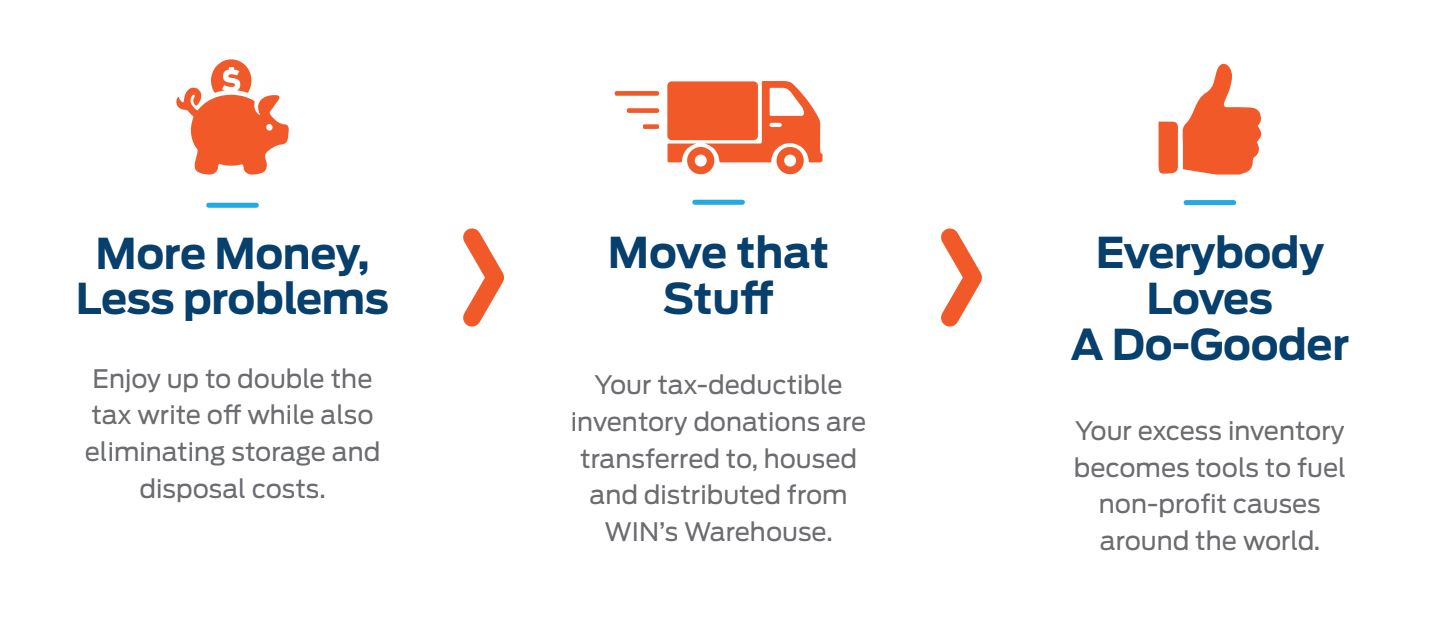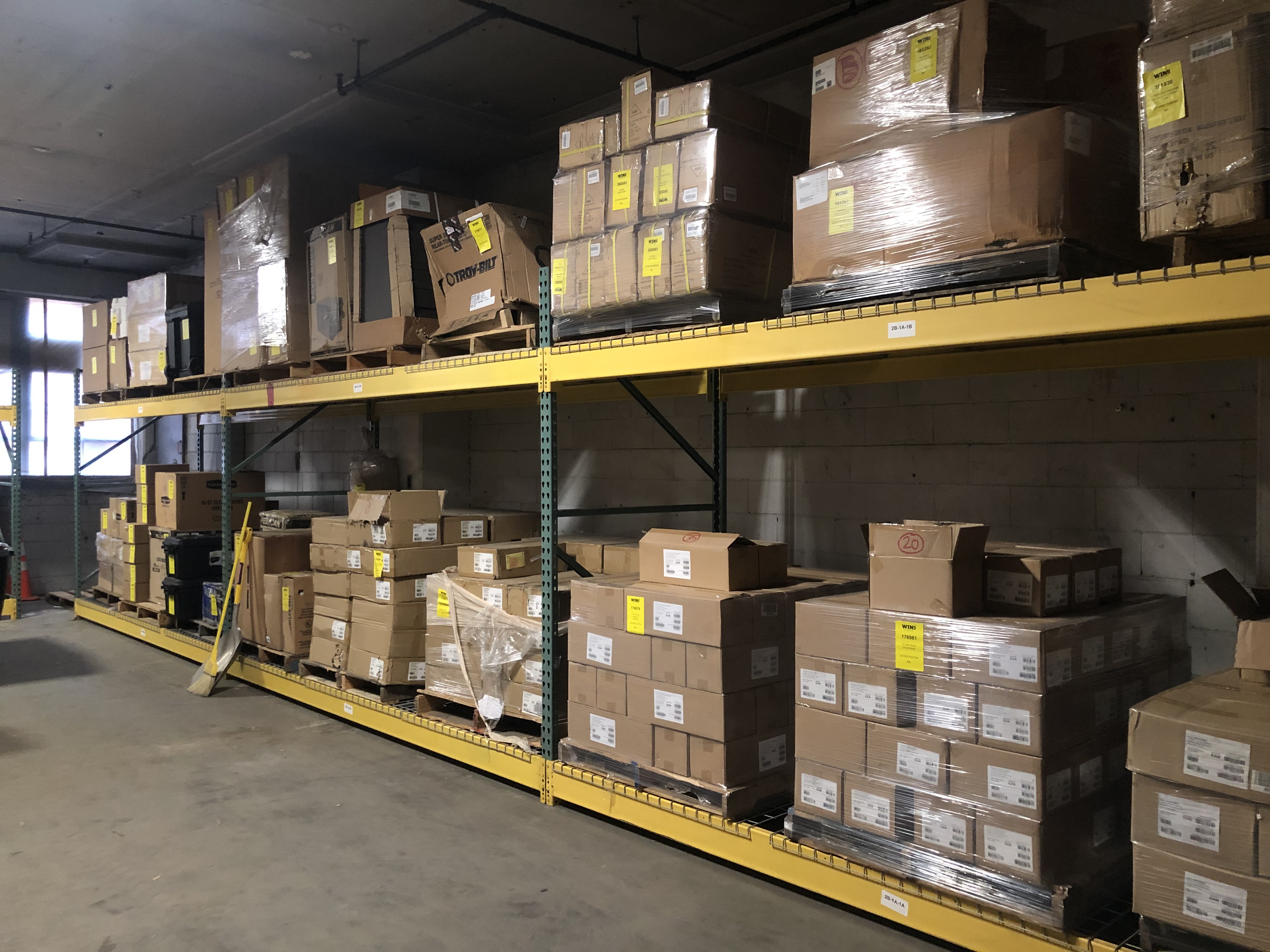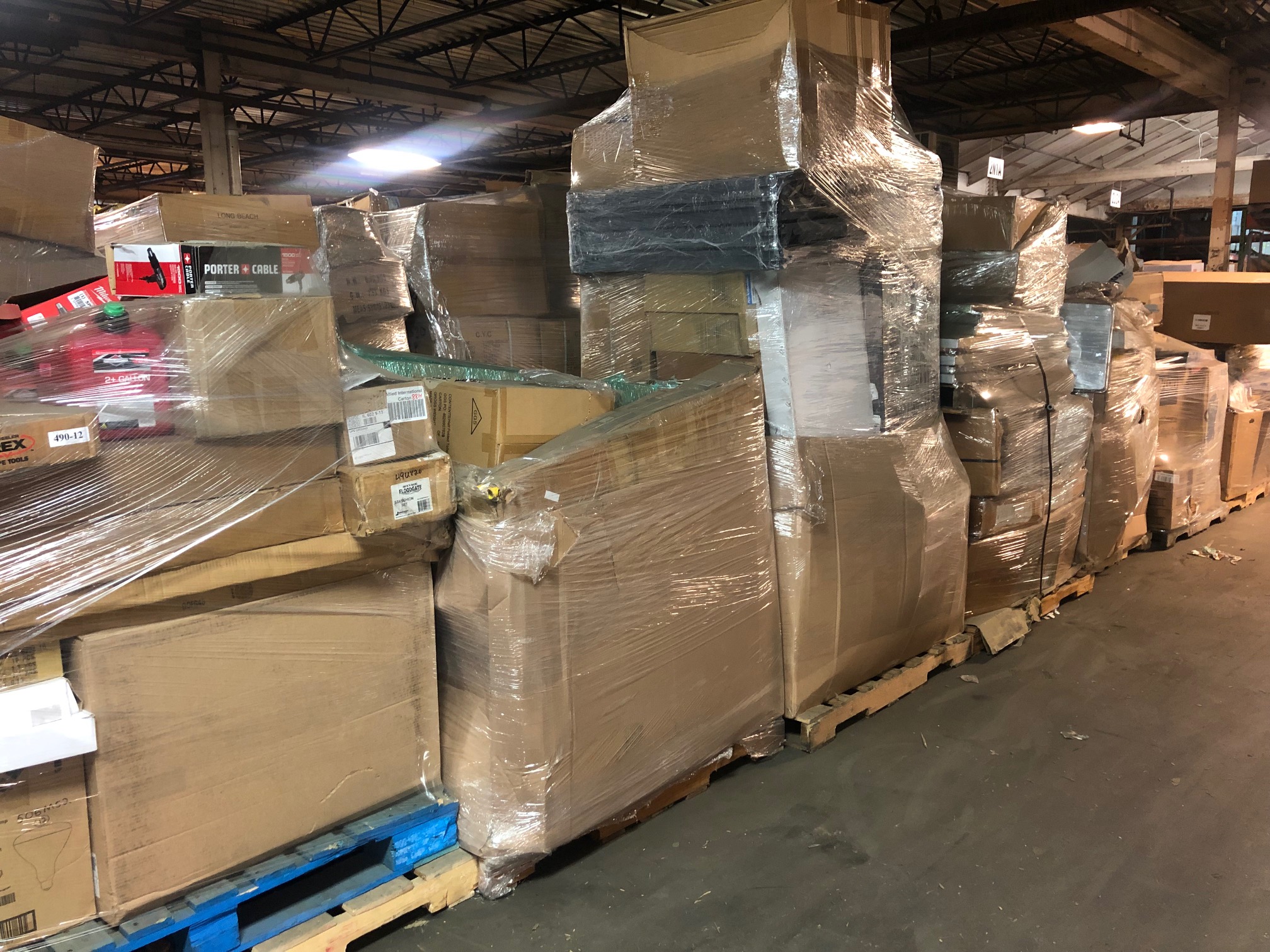Making the Circular Economy More Accessible
By Travis Laws, WIN Warehouse
WIN Warehouse reduces the time and cost of finding an inventory donation solution.
The importance of the circular economy is more prominent today than it ever has been before. Essential resources like fuel are becoming more expensive and customers are increasingly aware of a company’s social and environmental footprint.
Unfortunately, the larger a company becomes, the more difficult it can be to make changes necessary to adapt to the ever-evolving business landscape. At WIN Warehouse, we prioritize helping businesses quickly improve their reverse logistics into a more profitable and sustainable model.
FREE RETURNS TO THE CONSUMER ARE NOT FREE TO THE RETAILER
The 2021 holiday season was tough on businesses. Amid COVID precautions, rising inflation, and labor shortages, the average return cost retailers almost two-thirds of an item’s original price. Due to labor, transportation, and storage, these holiday returns showed a 7% increase in cost, and this came after major retailers faced higher logistic costs to even make the sale1.
The growing problem became more apparent when large corporations began offering “no-return refunds”— they decided it was more cost-effective to allow consumers to keep product rather than return it and deal with the subsequent shipping, handling, repackaging, and holding costs. Even for retail giants, this is an expensive way to handle reverse logistics and reveals the delicate balancing act that industry professionals are dealing with on a daily basis.
For low-dollar items, the cost of returns can obviate the value to the seller of getting the product back. Every industry is different, so companies need to find the price point where it is more cost-effective to have the customer keep the product versus returning it. Reverse logistics professionals need to pay attention to the market and stay flexible, because with steadily increasing fuel costs, this number will continue to rise. Finding this balance gets even more complicated for big-ticket purchases like electronics, where return costs were 15x higher than other items like clothing, due to the added expense of personal data removal.

ENGAGING IN THE CIRCULAR ECONOMY ISN'T JUST RESPONSIBELE, IT'S A COMPETITIVE ADVANTAGE
Consumers are increasingly interested in using ethically sourced products, as well as leveraging their purchasing power for good. From buying fairtrade coffee to supporting brands that actively give back, today’s shopper spends their money as an ethical statement. In fact, more than a quarter of consumers say they base their purchases on sustainability2.
Consumers continue to demand that companies actively work towards sustainability and advocate for fair wages and human rights. Shopping is increasingly done online (even for everyday goods), and the desire to buy from mission-focused brands with transparency continues to be a decision point for a significant part of the population. Consumers have an unprecedented sense of agency—where they choose to shop actually matters—and the brands that gain their trust and respect can quickly develop a loyal customer base.
ESG IS TAKING FRONT AND CENTER
Corporate responsibility matters to consumers more than ever before. So it’s only natural that investors are focusing on opportunities with that in mind. ESG reporting has a major consideration for investors as they watch the growing link between sustainability and profitability3.
Global sustainability challenges are becoming increasingly complex, bringing foundational business practices into question. Considering the cost of gas and the significant impact of fossil fuel production and emissions on the environment, smart businesses must continuously examine their shipping and delivery truck usage.
Companies can cut potentially thousands of delivery truck runs and the concurring gas usage by having consumers ship returns directly to WIN. Those items are then given to nonprofit organizations that need them, avoiding the landfill and helping those organizations improve their effectiveness.
A partnership with WIN can help a company eliminate waste and showcase its commitment to environmental and social responsibility while also improving profitability through special tax benefits. Donations are eligible for these tax benefits if they meet certain criteria, and can result in up to a 200% benefit in the amount that is able to be claimed.
ENHANCED TAX BENEFITS ARE AVAILABLE FOR INVENTORY DONATION - IF YOU FIND THE RIGHT PARTNER
According to Title 26 of the US Tax Code Section 170(e)3, S corporations are eligible for an enhanced tax credit if the donation goes to a nonprofit organization and is subsequently used directly by that organization in the course of their work4. This is a significant incentive to partner with a nonprofit organization to donate goods. But finding a nonprofit organization that can receive a donation, hold it, and use it can be costly and time-consuming, potentially offsetting the value of the tax benefits.
WIN Warehouse was created to step into that gap, connecting companies with hundreds of nonprofits that can benefit from their donation. WIN Warehouse holds donations and makes them available to their nonprofit members, streamlining the process for all involved parties and making participating in the circular economy simple and beneficial for everyone.

Items stored at Win Warehouse ready for distribution to non-profit organizations.
Companies who partner with WIN Warehouse don’t just improve their bottom line and empower nonprofits, they’re also improving their carbon footprint. WIN can act as a third party logistics partner, taking returns directly from customers. This takes the physical portion of the returns process off of the hands of WIN’s partners and eliminates the need for an entire shipping lane. Through this partnership, donations become the most cost-effective means of dealing with returns, rather than liquidating or having the customer keep them.
A WIN partnership also has the added benefit of keeping countless trucks off the road. Every one of WIN’s 3PL partners is responsible for less fuel consumption and fewer emissions — a great fact to highlight in any ESG report.
HOW WIN MAKES DONATING THE EASIEST WAY TO IMPROVE SUSTAINABILITY AND PROFITABILITY
When you donate excess inventory or process returns with WIN Warehouse, product is stored in our 150,000 sq ft warehouse and showroom. Our nonprofit members can use our website to browse available items and order them for a small handling fee. Ultimately, you can be sure that your donation ends up in the hands of a nonprofit that will use it, entitling your organization to enhanced tax benefits without spending time and energy to find a donation partner.
WIN has partnered with a diverse group of organizations serving many different communities. Our donors have been critical in empowering the work of nonprofits like Los Angeles Guinea Pig Rescue, Bridgeton Toys for Tots, Room at the Inn, and Employment Connection which supported veterans with suit donations for job interviews.
BECOME AN INTEGRAL PART OF THE CIRCULAR ECONOMY
WIN Warehouse is proud to assist nonprofits with their needs while also improving the sustainability efforts of our donors. When we handle returned goods properly, excess inventory can be a force for good, empowering and supporting the mission of hundreds of dedicated nonprofits.
To best serve you, we’ve created a place on our site specifically for reverse logistics professionals. If you’d like to partner with us to improve your sustainability efforts and your bottom line, visit http://reverselogisticsforgood.com.

A recent shipment of returned goods that were donated to WIN Warehouse - these are ready to be inspected, repackaged, and cataloged for distribution to WIN Warehouse’s network of non-profit members.
SOURCES
1CNBC, Retailers face rising holiday-return costs due to supply chain issues, a new report says
2CSRWire, Fairtrade America Reveals Top Consumer Trends for 2022
3Reuters, Analysis: How 2021 became the year of ESG investing
4FindLaw.com, 26 USC § 170 - US Code Title 26. Internal Revenue Code § 170
 Travis Laws
Travis LawsTravis was born with a passion for helping others and the ability to make people laugh. He was a low brass player all through his school years and graduated with a degree in music performance from Southeast Missouri State University. He still enjoys making music with his friends and can frequently be seen playing trombone or euphonium with several community groups. Having been a part of Worldwide Inventory Network (WIN) since 2002, he started as the executive vice president coordinating distribution efforts and managing our website. Travis now oversees all operations as the organization’s president. Travis and his wife, Tammy, live in St. Louis County, where they are recent empty-nesters. When he’s not working his magic at WIN Warehouse, he serves on numerous fundraising and event committees in the church and the community. He is currently an active member of the Shriners, where he enjoys raising money and awareness for Shriners Hospital for Children as a member of the clown troupe.